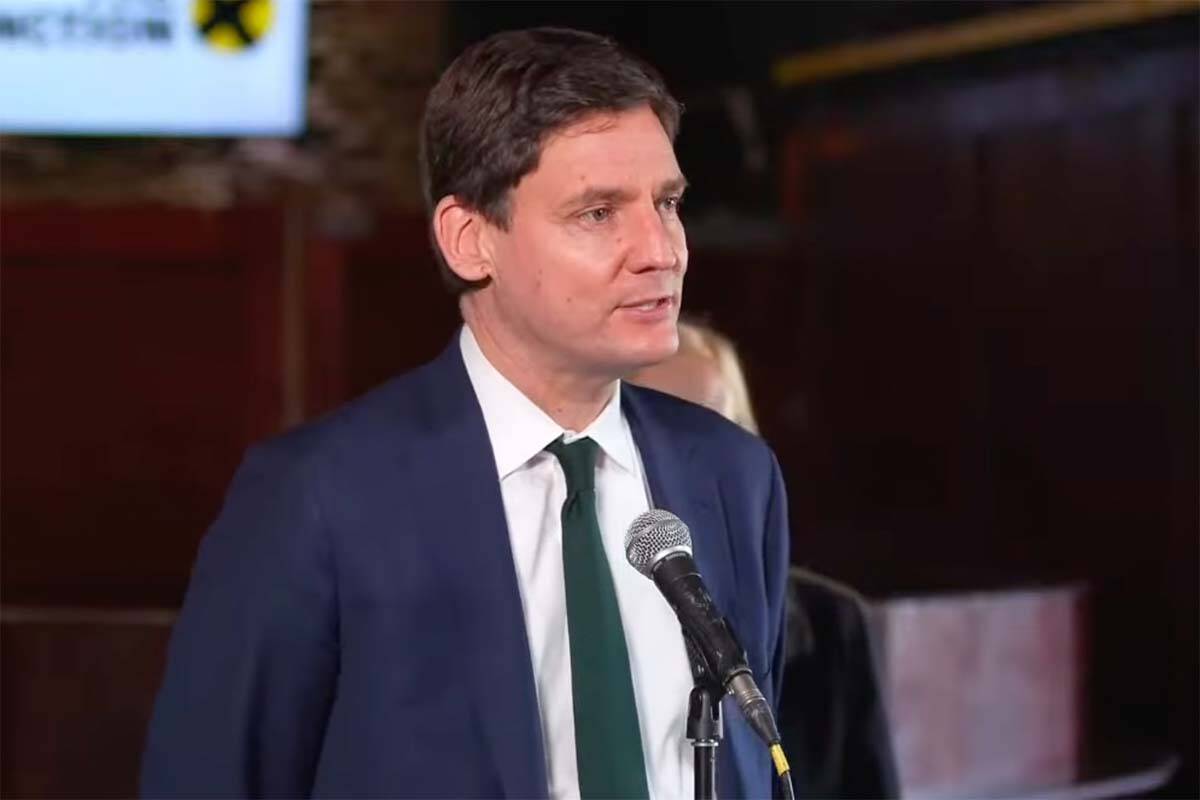B.C.’s business leaders offered David Eby critical and conciliatory tones about his pre-election budget, which the premier described as a necessary investment for future growth.
“It’s just not an option (to cut back),” he said. “We have to build out our province and as a trade-dependent economy, right now, we are feeling the malaise in the world economy, without a question. But when the world comes back, we need to be ready…and we will be ready…together.”
Some 24 hours after Finance Ministry Katrine Conroy tabled a budget with a record-breaking deficit of almost $8 billion, Eby addressed the Greater Vancouver Broad of Trade in Vancouver. He then responded to questions from GVBOT president and chief executive officer Bridgitte Anderson, whose organization gave the budget a letter-grade of C.
“I think the numbers were quite alarming for many people, seeing the largest-ever deficit, nearly $8 billion and $22 billion over three years and a 60 per cent increase in the debt rate over the time that you have been in office,” Anderson said. “Talk to us about how you plan to get the province back on a stronger fiscal plane, especially at a time when B.C. is lagging behind other provinces?”
RELATED: BUDGET 2024: B.C. runs record deficit of almost $8B, focuses on temporary relief
Eby said different provinces use different metrics to measure economic growth, noting B.C. has the third-highest GDP growth and the third-best debt-to-GDP ratio in Canada.
He added that the budget also has a conservative outlook with actual economic numbers “regularly” out-performing projections. He also noted that budget includes $10 billion in contingencies to deal with emergencies like wildfires and droughts and other unexpected expenses.
More broadly, Eby argued that the budget responds to a growing but aging society. Previous BC Liberals governments knew that the baby boomer generation would eventually retire, but did not prepare for it, he said.
“How is that a defensible decision? So we have to do this.”
Eby also pointed out that a “significant portion” of the provincial debt — some $36 billion — is going toward building out BC Hydro’s network. He later tied this spending to one of his favourite subjects, the build-up of a provincial hydrogen economy, with several projects hinging on the availability of power.
“But the level of electricity that they need is just mind-boggling,” Eby said. “The (proposed) Fortescue project (in Prince George) alone is 1 Gigawatt.”
When asked what government is doing to prepare for the pending conclusion of three major capital energy projects including Site C, Eby said building up B.C.’s infrastructure will spread economic growth across the province. He also pointed to other projects such as investments in Maple Ridge’s new $1-billion-plant building batteries for electric vehicles.
RELATED: B.C. builders and housing analysts happy with province’s direction
Hospitals, schools, day-cares and homes are also needed to respond to the province’s growing population, he said. These investments will also help maintain’s B.C.’s attractiveness as it competes globally for highly skilled labour such as doctors.
“The big challenge facing employers right now in the province has not been a shortage of opportunity,” he said. “It’s been a shortage of employees to take advantage of the opportunities that they see,” he said.
Anderson acknowledged housing has hampered the ability of business to attract and retain talent and praised the decision to raise the exemption threshold for the Employers’ Health Tax, set to benefit 90 per cent of all businesses.
“The budget, as you may have heard, delivered some relief for businesses, through the (EHT exemption), which the Board has been a strong advocate for,” she said in her opening remarks. “It’s an issue, we have been speaking to (GVBOT members) about in great detail over many, many months, so thanking for hearing from our members.”
Lori Mathison, president and chief executive officer of the Chartered Professional Accountants of British Columbia said the budget delivered “significant” financial help for British Columbians through the announced electricity rebate and the family benefit bonus. These (temporary) measures, coupled with BC Builds, “will work to relief some of the financial pressures” household are currently facing as they are looking to build a good life in B.C., Mathison said.
“However, it is of course very much a balance and we continue to watch the province’s total debt and debt-servicing costs and how they may impact affordability in the future.”
Eby later took his message to the Junction neighbourhood pub in Vancouver’s Davie Village, where he touted the EHT exemption as well as the budget’s temporary hydro rebate.
“We know that is not the full solution, but we also know every little bit counts for small business in our province.”

